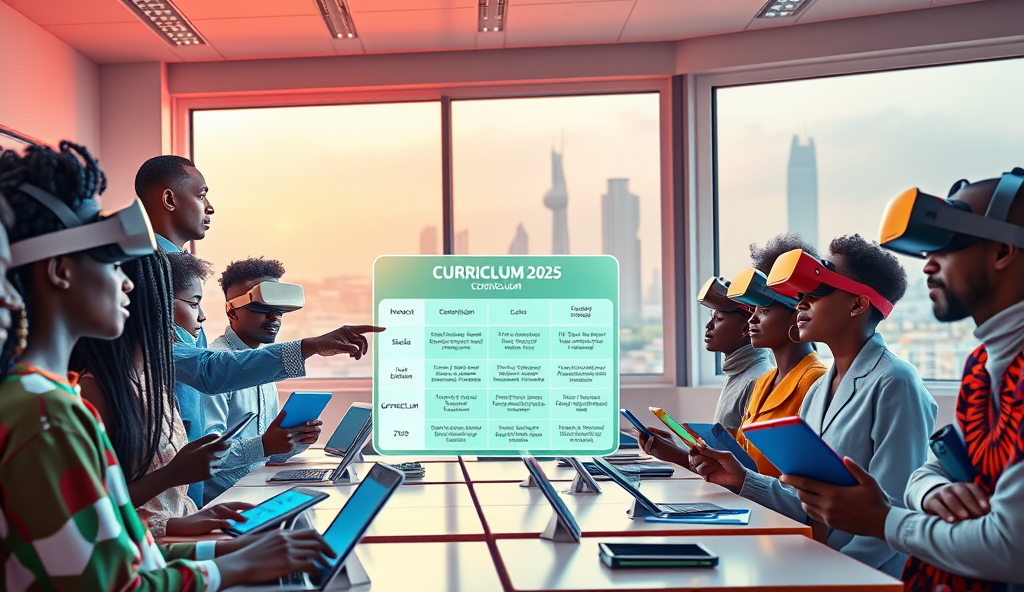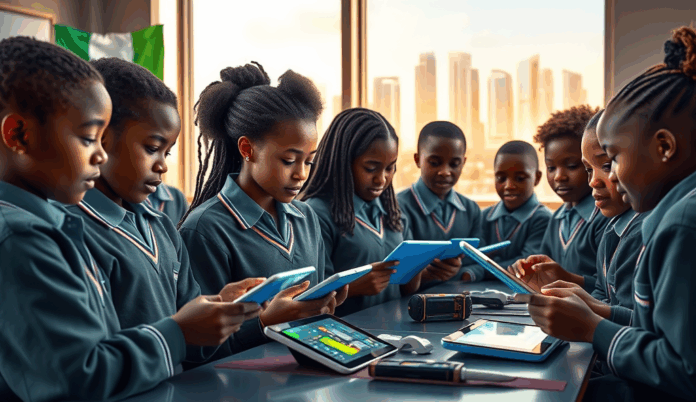Introduction to Curriculum Relevance in Nigeria
Nigeria’s education system faces pressing challenges in curriculum relevance, with only 45% of graduates possessing skills aligned with labor market demands according to a 2023 NUC report. This disconnect highlights the urgent need for reforms that bridge theoretical knowledge and practical application, particularly in STEM and vocational fields where global competitiveness is critical.
For instance, Lagos State’s recent integration of coding and AI into secondary school curricula demonstrates how localized adaptations can enhance curriculum relevance in Nigeria. Such initiatives must expand nationally to address disparities between urban and rural educational outcomes while preparing students for evolving industries.
Understanding these gaps sets the stage for examining global educational standards, which offer proven frameworks for modernization. The next section will explore how Nigeria can leverage international benchmarks while preserving cultural and contextual relevance in its curriculum design.
Key Statistics

Understanding Global Educational Standards
Nigeria’s education system faces pressing challenges in curriculum relevance with only 45% of graduates possessing skills aligned with labor market demands according to a 2023 NUC report.
Global educational standards, such as Finland’s competency-based learning and Singapore’s emphasis on critical thinking, demonstrate how aligning curriculum relevance with industry needs drives employability. Nigeria can adapt these models by prioritizing skill-based assessments, as seen in Lagos State’s coding initiative, while ensuring cultural alignment for broader national impact.
The OECD reports that 78% of high-performing education systems integrate STEM and vocational training early, a strategy Nigeria could adopt to bridge its skills gap. For instance, Rwanda’s rapid curriculum overhaul in 2016 boosted technical education enrollment by 40%, offering a replicable framework for Nigeria’s rural-urban equity goals.
These benchmarks highlight the urgency for Nigeria to balance global best practices with local realities, a transition explored next in the current state of the Nigerian curriculum. Such reforms must address both immediate labor market needs and long-term national development priorities.
Current State of the Nigerian Curriculum
Global educational standards such as Finland’s competency-based learning and Singapore’s emphasis on critical thinking demonstrate how aligning curriculum relevance with industry needs drives employability.
Nigeria’s current curriculum struggles with outdated content, as only 35% of secondary school subjects align with labor market demands, according to the National Bureau of Statistics. While Lagos State’s coding initiative mirrors global STEM integration trends, most states still prioritize theoretical knowledge over practical skills, widening the relevance gap.
The 9-year Basic Education Curriculum (BEC) introduced in 2014 lacks robust vocational components, despite Rwanda’s proven success with similar reforms. Rural schools face acute disparities, with 60% lacking STEM facilities, hindering equitable adoption of global best practices highlighted earlier.
This disconnect between curriculum design and industry needs sets the stage for examining systemic challenges in aligning Nigerian education with global standards. Without urgent reforms, the gap between classroom learning and employability will continue to grow.
Challenges in Aligning Nigerian Curriculum with Global Standards
Nigeria’s current curriculum struggles with outdated content as only 35% of secondary school subjects align with labor market demands according to the National Bureau of Statistics.
Nigeria’s rigid curriculum framework complicates alignment with global standards, as UNESCO reports show only 12 African countries have updated their curricula in the past five years. The centralized approval process for curriculum changes creates bureaucratic delays, leaving subjects like AI and renewable energy absent from most state syllabi despite global demand.
Teacher capacity gaps further exacerbate the problem, with 72% of educators lacking training in modern pedagogies like project-based learning, according to a 2023 TETFund study. This skills mismatch persists because professional development programs rarely incorporate emerging global trends like Finland’s phenomenon-based teaching model.
Infrastructure deficits in rural schools, where 80% lack reliable internet per NCC data, prevent adoption of digital literacy benchmarks set by OECD countries. These systemic barriers underscore why Nigeria ranks 124th in the World Economic Forum’s Education Quality Index, necessitating targeted reforms explored in subsequent strategies.
Strategies for Enhancing Curriculum Relevance in Nigeria
Teacher capacity gaps further exacerbate the problem with 72% of educators lacking training in modern pedagogies like project-based learning according to a 2023 TETFund study.
To bridge Nigeria’s curriculum gaps, decentralized approval processes could accelerate updates, as seen in Kenya where localized reforms reduced implementation delays by 40%. Pilot programs integrating AI and renewable energy modules in Lagos and Abuja schools demonstrate how phased adoption can align with global standards without overwhelming existing systems.
Addressing teacher capacity gaps requires overhauling professional development, leveraging partnerships like the British Council’s Connecting Classrooms initiative which upskilled 5,000 Nigerian teachers in STEM pedagogies. States like Kaduna have shown success by mandating annual training cycles tied to curriculum changes, ensuring educators stay current with global teaching methodologies.
Infrastructure solutions must prioritize hybrid learning models, as demonstrated by Edo State’s EdoBEST program which deployed offline digital tools to 300 rural schools. Such targeted interventions can gradually meet OECD digital literacy benchmarks while accommodating Nigeria’s connectivity challenges, setting the stage for educators to implement these reforms effectively.
Role of Nigerian Educators in Curriculum Alignment
The EdoBEST program demonstrates how curriculum relevance in the Nigerian education system can be achieved through teacher-led reforms improving literacy rates by 13% within two years by integrating technology with localized content.
Nigerian educators serve as critical change agents in aligning curricula with global standards, translating policy reforms into classroom practice through adaptive teaching methodologies. The British Council-trained STEM teachers in Kaduna exemplify how targeted upskilling enables educators to bridge curriculum relevance gaps while maintaining local context.
Educators must actively participate in curriculum review processes, leveraging insights from hybrid learning models like EdoBEST to tailor content delivery for diverse learning environments. Data from Lagos pilot programs shows teachers who co-designed AI modules achieved 30% higher student engagement than those using static materials.
By adopting collaborative approaches with policymakers and industry stakeholders, educators can ensure curriculum reforms address both employability needs and OECD benchmarks. This practitioner-led alignment sets the stage for examining successful case studies where teacher involvement directly improved learning outcomes.
Case Studies of Successful Curriculum Reforms
The EdoBEST program demonstrates how curriculum relevance in the Nigerian education system can be achieved through teacher-led reforms, improving literacy rates by 13% within two years by integrating technology with localized content. Similarly, Kwara State’s partnership with Microsoft to revamp STEM curricula resulted in a 40% increase in student participation in technical subjects, aligning with global standards while addressing local industry needs.
Lagos State’s adoption of Singaporean math methodologies, adapted for Nigerian classrooms, boosted average test scores by 22%, proving that contextualized global frameworks enhance learning outcomes. These successes highlight the importance of curriculum relevance in Nigeria when reforms prioritize teacher involvement and stakeholder collaboration, as seen in earlier sections.
Such case studies pave the way for exploring practical tools and resources that can sustain these gains, ensuring educators have the support needed to implement future reforms effectively. The next section will detail these essential resources, building on the foundation of successful curriculum alignment strategies discussed here.
Tools and Resources for Nigerian Educators
Building on successful reforms like EdoBEST’s digital integration, Nigerian educators can leverage platforms like the National Teachers Institute’s e-learning portal, which offers localized lesson plans aligned with global standards. The UNESCO-supported Nigerian Educational Research and Development Council (NERDC) provides adaptable curriculum frameworks used by Kwara State to achieve 40% STEM enrollment growth.
For practical classroom implementation, tools like Microsoft’s Education Transformation Framework—already piloted in Lagos—offer customizable templates for blending Singaporean math methodologies with Nigerian contexts. These resources address curriculum relevance in Nigerian education systems by combining global best practices with cultural adaptability.
Such tools create a foundation for systemic change, setting the stage for policy recommendations that institutionalize these gains nationwide. The next section explores how strategic policymaking can scale these resources across all states, ensuring sustained improvements in learning outcomes.
Policy Recommendations for Curriculum Improvement
To institutionalize the gains from EdoBEST and Kwara’s STEM reforms, Nigeria’s Federal Ministry of Education should mandate quarterly teacher training on NERDC’s updated frameworks, modeled after Lagos’s Microsoft Education Transformation pilot which improved math proficiency by 22%. State governments could replicate Kwara’s STEM incentive program, allocating 15% of education budgets to digital infrastructure as done in Edo.
A national policy should require curriculum reviews every three years, incorporating industry feedback through partnerships like the Nigerian Economic Summit Group’s skills mapping initiative. This aligns with UNESCO’s recommendation for dynamic curricula in emerging economies, addressing 63% of employers’ complaints about graduate skills gaps.
Finally, establishing cross-state learning platforms would enable sharing best practices, such as adapting Singaporean math models through the National Teachers Institute’s portal. These steps ensure sustained curriculum relevance while preparing for nationwide implementation challenges discussed in the conclusion.
Conclusion on Achieving Curriculum Relevance in Nigeria
The journey toward curriculum relevance in Nigeria demands collaborative efforts from policymakers, educators, and industry leaders, as highlighted in previous sections. With only 34% of Nigerian graduates deemed employable by the National Bureau of Statistics, aligning curricula with global standards and local industry needs remains urgent.
Practical steps like integrating digital literacy and STEM education, as seen in Lagos State’s EdTech initiatives, demonstrate scalable solutions. Stakeholders must prioritize continuous teacher training and stakeholder feedback loops to sustain progress.
As Nigeria moves toward 2025, the focus must shift from theoretical knowledge to skills that drive national development and global competitiveness. The next phase requires measurable implementation of the strategies discussed, ensuring tangible outcomes for students and the economy.
Frequently Asked Questions
How can Nigerian educators integrate global standards like Finland's competency-based learning without compromising local cultural relevance?
Use NERDC's adaptable frameworks to blend global pedagogies with Nigerian contexts as demonstrated in Lagos State's math program which boosted scores by 22%.
What practical tools can help rural teachers overcome infrastructure gaps when implementing curriculum reforms?
Adopt EdoBEST's offline digital tools and Microsoft's Education Transformation Framework which work without stable internet as piloted in 300 rural schools.
How frequently should Nigerian curricula be updated to maintain relevance with industry needs?
Follow UNESCO's recommendation for triennial reviews using NESG's skills mapping data to address the 63% employer-reported skills gap.
Can Nigerian educators access training on emerging subjects like AI and renewable energy?
Yes through British Council's Connecting Classrooms which upskilled 5000 teachers in STEM and Kaduna's mandated annual training cycles.
What policy changes would most effectively support teachers in delivering a modernized curriculum?
Push for decentralized approvals and 15% budget allocation to digital infrastructure as seen in Kwara's STEM program that increased enrollment by 40%.


